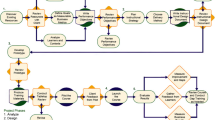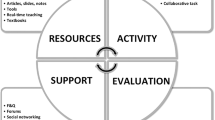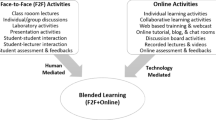Abstract
This study investigates perceptions of 29 prospective teachers about a course based on Project-Based Learning (PBL) approach. The course, ‘Authoring Languages in PC Environment (B-320)’ lasted in 14 weeks in fall semester of 2004–2005. In this course each prospective teacher carried out a project that requires designing and developing courseware individually. This study is qualitative in nature and data were collected through an open ended questionnaire composed of seven items and analyzed by content analysis technique. The results show that prospective teachers found PBL as an effective way of learning. It also suggests that when efficient guidance about technical issues and time management is provided, PBL approach can be successfully implemented in computer related courses such as programming language and web designing.


Similar content being viewed by others
References
Arends, R. I. (2001). Learning to teach. McGraw-Hill Humanities, New York
Best, J., & Kahn, J. (2003). Research in education (9th ed.). Prentice-Hall, Englewood Cliffs NJ
Bodner, G. M. (1986). Constructivism: A theory of knowledge. Journal of Chemical Education, 63(10), 873–878
Bogdan, R. C., & Biklen, S. K. (1998). Qualitative research for education: An introduction to teory and methods. Allyn & Bacon, Boston
Celik, S., Senocak, E., Bayrakceken, S., Taskesenligil, Y., & Doymus, K. (2005). Aktif öğrenme stratejileri üzerine bir derleme çalışması (A Review on Active Learning Strategies). Journal of Kazim Karabekir Education Faculty, 11, 155–185
Doppelt, Y. (2003). Implementation and assessment of project-based learning in a flexible environment. International Journal of Technology and Design Education, 13, 255–272
Education Development Center, (2003). Promising practices in Project-based learning at ctcs. Retrieved March 12 2004 from http://www.america connects.net/ research/PBL.pdf
Fleming, D. S. (2000). A teacher’s guide to project-based learning, ERIC Database, ED469734
Frank, M., Lavy, I., & Elata, D. (2003). Implementing the project-based learning approach in an academic engineering course. International Journal of Technology and Design Education, 13, 273–288
Ginestié, J. (2002). The industrial project method in French industry and in French schools. International Journal of Technology and Design Education, 12, 99–122
Green, A. M. (1998). Project-based-learning: moving students toward meaningful learning, ERIC Database, ED422466
Hill, A. M. (1997). Reconstructionism in technology education. International Journal of Technology and Design Education, 7, 121–139
Hill, A. M. (1998). Problem solving in real-life contexts: an alternative for design in technology education. International Journal of Technology and Design Education, 8, 203–220
Jonassen, D. H. (1994). Thinking technology toward a constructivist design model. Educational Technology, 34(4), 34–37
Juhl, L., Yearsley, K., & Silva, A. J. (1997). Interdisciplinary project-based learning through an environmental water quality. Journal of Chemical Education, 74(12), 14–31
Liu, M., & Hsiao, Y. P. (2002). Middle school students as multimedia designers: A project-based learning approach. Journal of Interactive Learning Research, 13(4), 311–337
Marx, R. W., Blumenfeld, P. C., Krajcik, J., & Soloway, E. (1997). Enacting project-based science: Challenges for practice and policy. Elementary School Journal, 94(5), 341–358
Mcmillan, J. H., & Schumacher, S. (2006). Research in education. Longman, New York
Mills, J. E. & Treagust D. F. (2003). Engineering education – is problem-based or project-based learnıng the answer? Australian Journal of Engineering Education, 4, Retrieved February 07 2004 from http://www.aaee.com.au/ journal/2003/mills_treagust03.pdf
National Research Council (1996). National science education standards. National Academy Press, Washington DC
Senocak, E., Taskesenligil, Y. & Sozbilir, M. (2006). A study on teaching gases to prospective primary science teachers through problem-based learning. Research in Science Education (in press). DOI 10.1007/s1116500690265.
Share, E., & Rogers, L. (1997). Get real! project-based learning. Learning, 25(4), 61–65
Solomon, G. (2003). Project-based learning: A primer. Technology & Learning, 23(6), 20–27
Thomas, J. W. (2000). A review of research on project-based learning. Retrieved March 1 2004 from http://www.bobpearlman.org/ BestPractices/ PBL_Research.pdf
Thomas, J. W., Mergendoller, J. R., & Michaelson, A. (1999). Project-based learning handbook for middle and high school teachers. Buck Institute for Education, Novato CA
Willard, K., & Duffrin, M. W. (2003). Utilizing project-based learning and competition to develop student skills and interest in producing quality food items. Journal of Food Science Education, 2, 69–73
Yildirim, A., & Simsek, H. (2005). Sosyal bilimlerde nitel araştirma yöntemleri (Qualitative research methods in social sciences) (5th ed.). Seckin Publication, Ankara
Yildirim, Z. (2005). Hypermedia as a cognitive tool: Student teachers’ experiences in learning by doing. Educational Technology & Society, 8(2), 107–117
Author information
Authors and Affiliations
Corresponding author
Appendix I—Open ended questions
Appendix I—Open ended questions
-
1.
Which challenge(s) did you experience during project work for “Authoring Languages in PC Environment “course according to you? How can those be overcome?
-
2.
Would you want same teaching approach to be used in other course you will enroll?
-
3.
What else could be done to improve project work? Please explain your answer?
-
4.
When you become a teacher, will you use project based approach in your course as in this course? If your answer is yes, what will you do different activities from we did in this course?
-
5.
Do you think you have really learnt using Macromedia Authorware? Please explain which factor affected your learning level?
-
6.
What kind of skills do you think you acquire except using macromedia Authorware?
-
7.
Have you got knowledge and skills which you can use in your professional life? Please explain your answer?
Rights and permissions
About this article
Cite this article
Karaman, S., Celik, S. An exploratory study on the perspectives of prospective computer teachers following project-based learning. Int J Technol Des Educ 18, 203–215 (2008). https://doi.org/10.1007/s10798-006-9021-1
Received:
Accepted:
Published:
Issue Date:
DOI: https://doi.org/10.1007/s10798-006-9021-1




